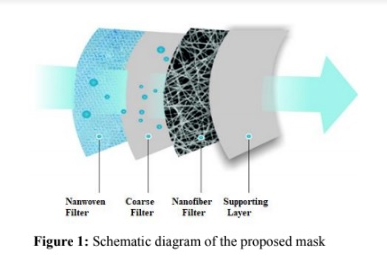 The Department of Science and Technology (DST) has approved support for development and upscaling of reusable N95 and N99 masks with enhanced antiviral and antibacterial property designed by Dr. Sri Sivakumar from Indian Institute of Technology, Kanpur under the Nano Mission.
The Department of Science and Technology (DST) has approved support for development and upscaling of reusable N95 and N99 masks with enhanced antiviral and antibacterial property designed by Dr. Sri Sivakumar from Indian Institute of Technology, Kanpur under the Nano Mission.
The masks will be made of nanofibers developed from polymers (e.g., chitosan, polycaprolactone, polyethylene terephthalate, polypropylene). They will have inorganic antiviral or bacterial nanoparticles as well as organic antiviral and bacterial molecules. The nanofiber-based masks will have four layers of construction, and filtration size would be 0.01 to 0.3 micrometers.
N95 and N99 are classified as an antipollution face mask, which possesses 95%and 99% filtration efficiency of 0.3-micron particulate matter, respectively. However, these masks fail to protect a person from the particle size lesser than 0.3 microns. To achieve higher filtration efficiency between the range of 0.01-0.3 micron particulate matter (e.g., Coronavirus, bacteria, and other pollutants), the mask has to be designed with finer pore size.
Currently, available masks face challenges such as air pressure drop, which causes breathing problems, inefficiency in the filtration of particles lesser than 0.3 microns, and are limited to single-use. Further, they do not deactivate the pathogens. Consequently, a used mask can even become a vector and carriers for disease. Thus, it is essential to design an antiviral/bacterial mask with enhanced filtration efficiency, reduced pressure drop, and reusability.
"Design of a reusable antiviral/antibacterial mask, with enhanced filtration effective even below 100-nanometer levels together with the reduced pressure drop for the ease of breathing, is the holy grail of protective masks. Any significant progress in this direction is a welcome step," said Professor Ashutosh Sharma, Secretary, DST.
The facial masks proposed by Dr. Sivakumar will be designed to kill the virus once it enters the mask filter and hence does not act as a secondary source of contamination. It will also be designed and fabricated in such a way that it can be washed or sterilized for re-use multiple times. Hence it can be used for a longer period of time and reduces effective cost to the general population and makes it more affordable. A prototype of this nanofiber-based N95 and N99 masks will be certified by competent authorities.
For more details contact Dr. Sri Sivakumar (srisiva[at]iitk[dot]ac[dot]in, +91-9452048636)






























